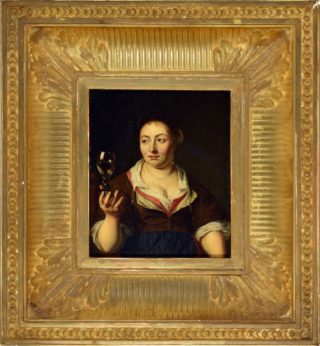1913-006
Remembering the touch of her mother’s hand La Betty cringed. Not that her mother’s mothering was eerie. Since babyhood La Betty had increasingly considered any creature’s living skin to be eerie. As a child La Betty had studied her own skin – hands, legs, belly – and had been nauseated.
At the age of twenty-two La Betty’s haphephobia was amplified when she unexpectedly noticed a TV documentary presenting an outline of evolution. From then on La Betty was certain every organ of the human body had begun as a distinct colony of aquatic animalcules that long ago were swallowed, but not digested, by a huge swimming bag of living skin. La Betty decided not to ever again expose her mind, soul or body, not even for a moment, to biology, embryology, physiology, anatomy, pathology and certainly not dermatology.
By age twenty-four La Betty had spent her entire inheritance on a condo overlooking English Bay. She could stare out the window without seeing people. La Betty’s trust fund was forever and so La Betty had easily secured every possible furnishing and service necessary to maintain her health, her beauty and her attention to IPhone, tablet, IPad, laptop, TV, even a radio. In this perfect prison of financial freedom La Betty shielded her soul from every reminder of organic humanity, especially her own.
La Betty then persuaded herself that everything, even when it appears most solid, is, in its finality, only a thought, a mirage presented by the brain. Most importantly, thought does not have a skin. This disembodied view led La Betty to adore mass media advertising. And advertising led her to adore shopping. A really effective image would impel La Betty to make a purchase. Yet La Betty’s was not compulsive shopping; it was compulsive attention to the possibility of shopping. As a shopping adept, eschewing analysis or fact, La Betty restricted her acquisitive desire to objects favoured by celebrity endorsement and with a breath-taking price. These criteria confirmed, La Betty knew what she liked. It is probably accurate to say consumerism replaced her insanity.
One day an antique green silk Fortuny dressing gown arrived by amazon.com drone. The elegant undulating gown was embroidered with gold curlicues aligned in parallel from décolletage to hem. Tightly coiled the dainty glittering curlicues were almost but not quite rosebuds. Dozens of silk acanthus appliqués complemented the curlicues.
La Betty was always curious to inspect a garment’s label. This one was an ornately detailed quite tiny linen rectangle, upon which a finely embroidered design was perceptible. As if brushstrokes, each delicate thread was mimicking the style of a seventeenth century oil painting in a tortuously carved dark walnut frame. Inevitably La Betty perceived the label as an actual screen far teensier than her IPhone screen. Soon, framed by darkness, an image of a comely young Dutch woman became visible. Portrayed in pliant thread the woman was breathing and shifting. La Betty shuddered at the woman’s supple cheeriness, and La Betty was agog at the woman’s bosom. The expanse of voluptuous flesh catapulted La Betty into a panic.
La Betty gasped. She knew immediately of course that this image had been deliberately conjured to arouse the senses. There had to be an uncouth entity, a wraith somewhere in the room, something jeering at La Betty’s lifestyle, polluting the chaste superficiality of La Betty’s expensive tastes.
La Betty fortified herself with a slogan, “Aquafina. Purity guaranteed!” She paused and then yelped, “Aquafina. The sweet taste of purity!”
Rolling a blood red cranberry around in her mouth the Dutch woman spoke, “Zonder het vlees is alles verloren.” [Without flesh all is lost.]
The woman thrust herself forward, almost leaning out of the frame. La Betty recoiled from the ample wine to envelope the tongue, the warm velvet sleeve available at a touch, the fair plump cheek to pet, perhaps as prelude to slipping a hand further along to the loosened blouse and then beneath the blouse to slide along the smooth perfumed shoulder.
By gesture, by shifting her abundant skirts and by the look in her eye the young woman implied she would transport La Betty to a carnal lifestyle. With her every movement the young woman was signaling to La Betty, presenting a wordless promise, the promise of an endlessly sensual life.
La Betty shook her head again and again. In a little while, having recited “Ivory Soap. 99 and 44/100ths per cent pure” fifteen times La Betty was safely alone with the cold green gown.
Dutch, 1635–1681
Woman With Wine Glass, no date
oil on panel
17.1 x 15.4 cm
MacKenzie Art Gallery, University of Regina Collection, gift of Mr. Norman MacKenzie
1913-6
